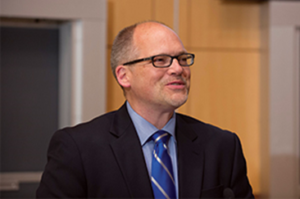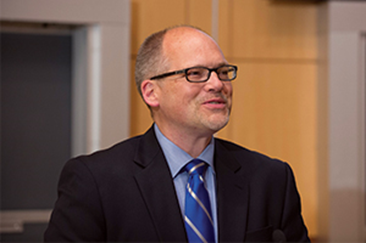Professor Spotlight: Dana Harriger
By Luis Gonzalez
Dr. Dana Harriger is a Professor of Biology, and one of a team of four biologists, here at Wilson College.
Known by many students as a very enthusiastic professor, Dr. Harriger’s passionate and experiential demeanor towards Biology encourages a great learning environment for aspiring Biologists.
Growing up, Dr. Harriger notes that he was raised in a family that was “strong in the sciences.” His father being a physician and his mother a nurse.
He received a “strong science background in high school” and pursued his undergraduate degree at Juniata College, majoring in Biology.
At Juniata, Biology became his focus, especially cellular/structural biology, through the “interactions and encouragement from the faculty there.” Electron microscopy and histology being classes would further fuel his interests.
His Master’s and Ph.D. were conducted in a research lab, where he did work with developing human skin equivalents, and during his graduate work, he was provided “the opportunity to teach and mentor undergraduate and graduate students.”
He was also afforded the opportunity to write research grants, articles, and work with high school summer programs. He claims that this was an “amazing time of my life but I also took advantage of the opportunities that were available.”
Just then, he accepted a position with another skin lab as a postdoctoral research fellow at Shriner’s Burn Institute and with the Dept of Transplantation Surgery at the University of Cincinnati, where he “oversaw an electron microscopy facility as part of my initial position where I became involved in numerous research studies but also conducting clinical research growing a different skin equivalent in vitro and applying it to burn patients in vivo.”

Once again, he was afforded many opportunities as a research fellow from writing grants and articles but also pursued teaching in the evenings at two universities as a way to maintain a sense of balance.
In 1996, he would join Wilson, initially hired in a three-year position which was converted to tenure track. He voices that he “really wanted to pursue teaching at a liberal arts college and provide the type of support and mentorship to students that I received as an undergraduate.”
He acknowledges that although there were struggles, he tries to look at things as opportunities, and when looking back at the things he has been able to be part of while teaching and mentoring students, he has felt very rewarded both personally and professionally.
When it comes to working at Wilson, he advocates that “the interaction with the students and hopefully helping turn on light bulbs and seeing the ‘ah hah’ moments” is what he likes most.
He also enjoys getting to know the students as they journey along their four years, helping navigate that journey with them, and the overall interaction “whether it’s in the classroom, the lab, in the hallway or office.”
When interviewed about his favorite class to teach, he notes that “I truly love teaching General Biology but I also love the intricacies of cellular mechanisms and pathways that we discuss in courses like Cell Biology, Developmental and Immunology. It goes back to the journey the students are on – General Biology allows the light bulbs to turn on but the upper-level courses allow the light to get brighter as we probe deeper into the understanding.”
When it comes to teaching during the pandemic, he claims that “I like to engage with people, in person, so I personally have not enjoyed how the pandemic forced Institutions to pivot.”
But as we learned earlier, he likes to see struggles as opportunities, and utters that he has learned a lot over the past year with regard to different pedagogical approaches and the utilization of and broader capabilities of online and virtual technologies”
Finally, as a tip for students to do well in their online courses, he advises them to remain engaged with each other, utilize technology as a tool, be proactive and mindful of their time and schedules, carve out ‘you’ time, and above all else, “utilize your support systems”.

